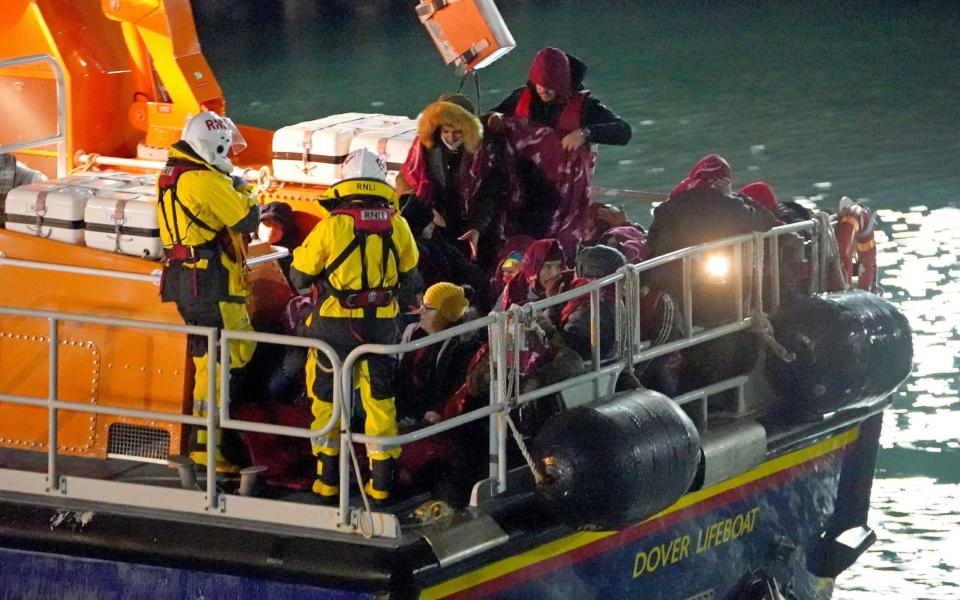Creating safe routes for migrants could put Nigel Farage in No 10, says Lord Blunkett

Lord Blunkett has warned that creating safe routes for migrants to come to the UK could put Nigel Farage in Downing Street.
The former home secretary said “the politics is toxic when it comes to migration” as he cautioned Sir Keir Starmer, the Labour leader, against a policy of softening the asylum system.
Speaking after the death of at least 27 people in the Channel, Lord Blunkett said there was “no silver bullet” to fix the Channel migrant crisis and he argued progress would only be made through increased cooperation between the UK and its European neighbours.
Labour pledged in its 2019 general election manifesto to “establish safe and legal routes for asylum seekers” to come to the UK.
Nick Thomas-Symonds, the shadow home secretary, recently spoke of the need to provide “properly managed safe and legal routes”.
But on Thursday, Lord Blunkett warned against making it easier for asylum seekers to reach Britain.
It was put to him in a BBC interview that some on the Labour Left believed the solution to the crisis was to formalise routes across the Channel to allow people to come to the UK to submit an asylum claim.
Told that such an approach would likely not result in a “huge” spike in asylum claims, the Labour peer replied: “Well, the numbers might not be but Nigel Farage might end up being prime minister and that could even be worse than what we have got at the moment.
“The politics is toxic when it comes to migration … we have got something like a third less asylum seekers than the French and vastly lower numbers than the Germans.
“But that doesn’t stop people actually believing that there is a flood coming in and so what we have got to do is to work with our counterparts in Europe.”
His comments came as Priti Patel urged France to allow Border Force and police officers and even troops to patrol its beaches to help intercept migrants and prevent more deaths after 27 people drowned off Calais on Thursday.
In a phone call with her French counterpart Gerald Darmanin, the interior minister, she repeated her call for joint Anglo-French patrols on sea and land and a returns agreement that would allow for Channel migrants to be sent back to France from the UK.
‘We’re not heartless - we do care’
The police officers would be “unwarranted,” without powers of arrest, to avoid conflicts over sovereignty and could be under French command, said Ms Patel, who also promised an additional package of ANPR cameras to catch smugglers, drones and surveillance equipment.
“We are not working just to end these crossings because we don’t care and we’re heartless. The UK has a clear and a generous, humane approach to asylum seekers and refugees,” she said.
“Yes, people should come here legally and the system must be fair, but the main issue is this: crossing the Channel in small boats is extremely dangerous and [Wednesday] was the moment that many of us had feared for many years.
“The criminals that facilitate these journeys are motivated by self-interest and profit, not by compassion. They threaten, intimidate, bully, and assault the people who get into these boats, and they have a complete absolute disregard for human life.”
France has previously rejected offers of joint patrols but home office sources said Mr Darmanin had not expressed a view on any specific proposal.
A question of sovereignty
Reaction in France was, however, mixed. Pierre-Henri Dumont, the Republican MP for Calais, rejected the proposal for extra officers on the beach as a “crazy solution” that “will not change anything” along the vast shoreline because it would require thousands of officers to police it.
“I’m not sure having more police officers or soldiers on the French shore will help to stop these crossings. We have 200km [125 miles] of shore to monitor 24/7. It only takes five to 10 minutes to put a dinghy to sea filled with migrants so I am not sure it is only a question about money and number of men.
“There is also the question of sovereignty. I am not sure the British people would accept the other way round if the French army was patrolling the British shore,” he said.
Bruno Bonnell, an MP representing President Emmanuel Macron’s En Marche! party in France, said that as long as it was not a political gesture but a genuine “common operation ... I think that is something that could probably help the situation, and I would support that.”

 money
money 